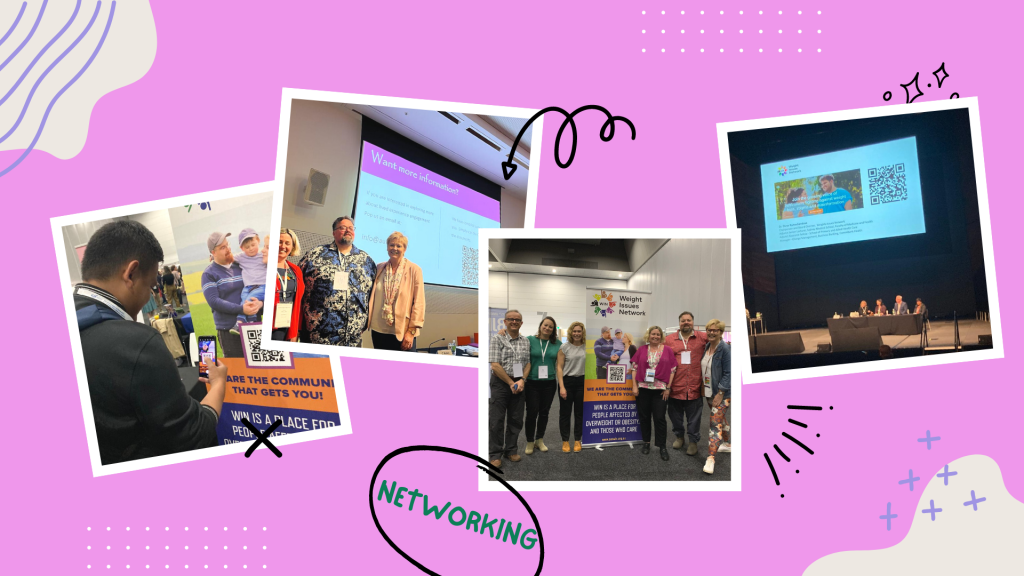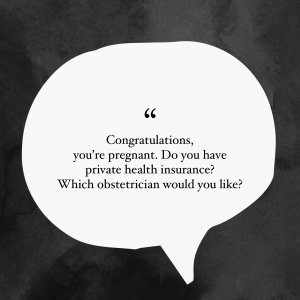Report by Clare Mullen, Health Consumers’ Council WA
In October 2022, over 1,000 people were in Melbourne to participate in the International Congress on Obesity.
I had the opportunity to attend as a member of the Weight Issues Network (WIN) as a Lived Experience speaker, as well as through my roles with Health Consumers’ Council WA, The WELL Collaborative and the Obesity Collective. My attendance was part funded by WIN (thanks to support from the ICO organisers) and part by HCC, through my work on the WELL Collaborative, that’s funded by WAPHA and the Department of Health.
There were three other people from WIN who attended as Lived Experience speakers. Dr Nic Kormas, also on the WIN Board as a clinician, was attending too.
There were three main streams of content:
- Basic research[1]
- Clinical – looking at treatment and care
- Public health – looking primarily at prevention options
There were also a number of cross-cutting sessions – where people with perspectives from each of these streams all presented together. Apparently this is not very common – which I found surprising.
Lived Experience/consumer speakers were involved in five of the sessions, and we also ran a workshop on “So you want to engage people with lived experience of obesity?” which was attended by about 50 people. We all received positive feedback about our contributions to the discussions, and I hope we’ve paved the way for Lived Experience speakers to be involved in more of the sessions in future.
We also had a table in the exhibition hall and had people signing up to the WIN mailing list, as well as taking away a practical guide to creating weight inclusive spaces in clinical settings. (I have some of these in hard copy, so let me know if you’d like one to take along to any healthcare setting you attend regularly!)
Takeaways and personal reflections
- If carrying extra weight is either causing you health concerns, or you’re concerned about your increased risk of future health concerns, treatments are available. These include a few different types of medications as well as surgery – and options are increasing. These clinical interventions may complement individual behaviour which could include changes to nutrition, physical activity, sleep, stress and social connections.
- Extra weight can be a risk factor for some people for some health issues. To work out if carrying extra weight has health implications for you it’s important to speak with an informed health professional who has contemporary and detailed knowledge on obesity, overweight and health – and can help you assess your personal risk, in the context of your life, so you can work out the best treatment and care options together.
- Currently, it’s really hard to find informed health professionals who have contemporary and detailed knowledge on obesity, overweight and health. Health Consumers’ Council is working with the WA Primary Health Alliance and the WA Department of Health to provide consumers with access to a list of health professionals who have undergone additional training on this topic as a starting point – watch this space!
- Adolescence may be a critical time to offer person- and family-centred interventions – changes made at this point can be life-changing and long-lasting.
- There is a critical shortage of treatment services for obesity – particularly for adolescents. (I personally find this borderline unethical.)
- I think there needs to be a lot more discussion and review about bariatric surgery. I learned that currently, it’s believed to be difficult to work out which patients will get positive outcomes from the treatment – with outcomes varying significantly. I was also reminded that one of the possible benefits of this surgery is extended life expectancy – and that this effect may still be likely, even if someone regains weight after the surgery. (Overall, I think we need to upskill a few more consumers to learn about the technical details of this treatment and cast an informed consumer lens over the evidence and be part of the debate. I certainly don’t feel informed enough to go up against clinical experts on this subject.)
- From a value-based healthcare point of view, I believe there could be some consideration given to funding models for bariatric surgery – for example, I wonder whether surgeons would be more invested in helping people to work out if surgery was going to be right for them, if the surgeon’s payment was impacted by the outcomes of the surgery (as assessed against patient-reported outcome measures agreed upfront). In fact, this could be applied to lots of types of treatment…
- Weight stigma has a huge role to play in muddying the waters on healthcare in this area. I’m left wondering, how can we get to a place where everyone can distinguish between decisions we’re making based on desires we might have to look a certain way (influenced by societal pressures) versus decisions we’re making that could improve our health – and so make a really informed decision about what actions to take?
- I think we also need more deliberative discussions as a community about how we navigate the various aims of a) dismantling the obesogenic environment[2] we live in, b) creating the conditions where people are able to more easily do things that have a positive impact on health (and broaden this beyond nutrition and physical activity), and c) ensuring personalised care and treatment is available to people whose health is impacted by carrying extra weight. Unfortunately, the public health narrative still too often contributes to weight stigma.
Clare Mullen, October 2022
p.s. as well as the serious work, it was great to meet and connect in person with the people involved in this work that I’ve been meeting online for the last couple of years.
[1] Basic research, also called pure research or fundamental research, is a type of scientific research with the aim of improving scientific theories for better understanding and prediction of natural or other phenomena, https://en.wikipedia.org/wiki/Basic_research#cite_ref-Research2014avg_1-0
[2] “The term ‘obesogenic environment’ is used to describe an environment that promotes obesity”, https://www.aihw.gov.au/reports/overweight-obesity/overweight-and-obesity/contents/causes-of-overweight-and-obesity







